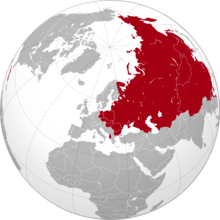

The term "Soviet empire" collectively refers[by whom?] to the world's territories that the Soviet Union dominated politically, economically, and militarily. This phenomenon, particularly in the context of the Cold War, is also called Soviet imperialism[1][2] by Sovietologists to describe the extent of the Soviet Union's hegemony over the Second World.
In a wider sense, the term refers to Soviet foreign policy during the Cold War, which has been characterized as imperialist: the countries that comprised the Soviet empire were nominally independent with native governments that set their own policies, but those policies had to stay within certain limits decided by the Soviet government. These limits were enforced by the threat of forceful regime change and/or by the threat of direct action by the Soviet Armed Forces (and later by the Soviet-led Warsaw Pact). Major Soviet military interventions of this nature took place in East Germany in 1953, in Hungary in 1956, in Czechoslovakia in 1968, in Poland from 1980 until 1983, and in Afghanistan from 1979 until 1989. Countries in the Eastern Bloc were widely regarded as Soviet satellite states rather than as independent allies of the Soviet Union.
Cite error: There are <ref group=lower-alpha> tags or {{efn}} templates on this page, but the references will not show without a {{reflist|group=lower-alpha}} template or {{notelist}} template (see the help page).
- ^ Kassymbekova, Botakoz (24 January 2023). "How Western scholars overlooked Russian imperialism". Al Jazeera. Retrieved 13 April 2023.
- ^ Duda, Andrzej (17 September 2022). "Remembering Soviet imperialism". Taipei Times. Retrieved 13 April 2023.